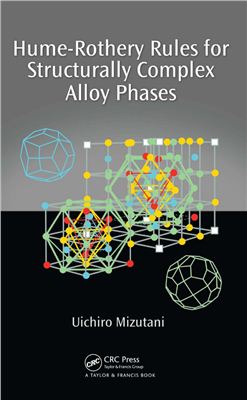CRC Press, Taylor and Francis Group, 2011, 342 pages
With a history that reaches back some 90 years, the Hume-Rothery rules were developed to provide guiding principles in the search for new alloys. Ultimately, the rules bridged metallurgy, crystallography, and physics in a way that led to the emergence of a physics of the solid state in 1930s, although the physical implications of the rules were never fully resolved. Even today, despite a revived interest brought about by the 1984 discovery of quasicrystals, much about the rules remains an enigma.
Now almost a century after the rules were put forward, Hume-Rothery Rules for Structurally Complex Alloy Phases provides researchers with an insightful and applicable interpretation of the Hume-Rothery electron concentration rule. Invoking first-principle band calculations, the book emphasizes the stability of structurally complex metallic alloys (CMAs).Written by Uichiro Mizutani, long considered the most knowledgeable expert on both the history and science of Hume-Rothery, this seminal work.
Offers a unified interpretation of phase stabilization mechanism of CMAs in different classes
Explains how to determine the effective valency of transition metal elements
Details establishment of d-states-mediated-FsBz interactions in strongly orbital-hybridizing systems
Covers the contrast between e/a and VEC, two notions of electron concentration parameters and includes a way to differentiate between them in designing new alloys
Explores strengths and shortcomings for the theory on alloy phase stability
Discusses the latest take on electron concentration for gamma-brass
This work summarizes the ongoing history of Hume-Rothery and reflects the theoretical studies that Professor Mizutani embarked upon to gain deeper understanding of the basic physics behind stabilizing effects related to electron concentration. It describes how metallic and covalent bonding styles can be harmonized to stabilize a given phase in relation to electron concentration and electrochemical effect as defined by the rules. Beyond theory, the approaches presented in these pages will prove of great value to researchers developing new functional metals and alloys.
With a history that reaches back some 90 years, the Hume-Rothery rules were developed to provide guiding principles in the search for new alloys. Ultimately, the rules bridged metallurgy, crystallography, and physics in a way that led to the emergence of a physics of the solid state in 1930s, although the physical implications of the rules were never fully resolved. Even today, despite a revived interest brought about by the 1984 discovery of quasicrystals, much about the rules remains an enigma.
Now almost a century after the rules were put forward, Hume-Rothery Rules for Structurally Complex Alloy Phases provides researchers with an insightful and applicable interpretation of the Hume-Rothery electron concentration rule. Invoking first-principle band calculations, the book emphasizes the stability of structurally complex metallic alloys (CMAs).Written by Uichiro Mizutani, long considered the most knowledgeable expert on both the history and science of Hume-Rothery, this seminal work.
Offers a unified interpretation of phase stabilization mechanism of CMAs in different classes
Explains how to determine the effective valency of transition metal elements
Details establishment of d-states-mediated-FsBz interactions in strongly orbital-hybridizing systems
Covers the contrast between e/a and VEC, two notions of electron concentration parameters and includes a way to differentiate between them in designing new alloys
Explores strengths and shortcomings for the theory on alloy phase stability
Discusses the latest take on electron concentration for gamma-brass
This work summarizes the ongoing history of Hume-Rothery and reflects the theoretical studies that Professor Mizutani embarked upon to gain deeper understanding of the basic physics behind stabilizing effects related to electron concentration. It describes how metallic and covalent bonding styles can be harmonized to stabilize a given phase in relation to electron concentration and electrochemical effect as defined by the rules. Beyond theory, the approaches presented in these pages will prove of great value to researchers developing new functional metals and alloys.

